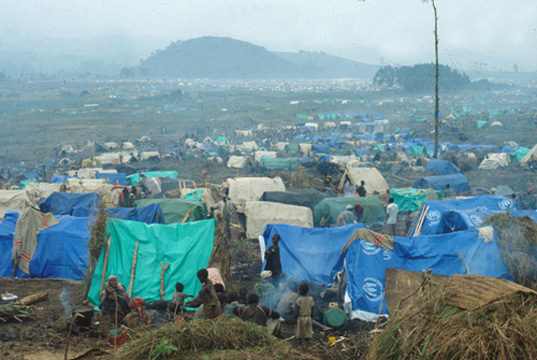To Give A Helping Hand
Anika Shringi
© Copyright 2024 by Anika Shringi


Rwanda refugee camp. Photo courtesy of Wikimedia Commons.
To Give A Helping HandAnika Shringi © Copyright 2024 by Anika Shringi  |
 Rwanda refugee camp. Photo courtesy of Wikimedia Commons. |
Fast-forward a year, Rwanda was in a state of rehabilitation and recovery. To aid this, the United Nations organized a group of volunteers to promote their mission. This is Dhruv’s experience living in a jungle camp with over a million refugees of a ravaged country.
The camp hosted about a million refugees and 200 aid volunteers. It was located near a town called Mwanza. Seeing the state of the country, not much could have been expected from the state of the camps. We had to fly on the ricketiest six-seater plane known to man across Lake Victoria to reach here. There was no airport for the aircraft to land—just a clearing in a forest. We were surrounded by wild animals the second we touched the ground. They observed us with a watchful eye but never made a move to come closer, always keeping to themselves. It was strange; they were so sullen, as if they knew of the tragedies and were embodying the feeling of despondency in the atmosphere.
The facilities were poor, and we were already low on food from day one. We couldn’t complain, though, seeing the condition of poverty the locals and refugees were in. We were thankful to have meat on our bones. The barren land was not only reflected in our surroundings but in the eyes of the people. They were soulless, helpless, resigned after all the horrific violence they were forced to see and endure. The most shocking thing I saw were dead bodies scattered around like holiday decorations, just left lying there, just another casualty. There were numerous deaths from diseases and starvation, and one just became accustomed to the fact that it was a part of life. The locals had no reaction to it, as if it was an everyday thing—just another body to add to the list.
I was there for about 8–9 weeks, which is quite a long time, but the days went by fast; the sun seemed to disappear as soon as it rose. There was no time to stop and dwell on the myriad of bugs or the unsanitary conditions we were living in. There was just so much to do. I ran point on food distribution and passing out essential items to the people in the camps. I remember their sad but grateful faces every day, their features sunken due to malnourishment. Every day, without fail, I would drive my jeep, provided by the UN, through thick marshy jungles with bags of grain in my trunk. Along with that came a wave of anxiety from driving through a jungle with open bags of food, alone, always on the lookout for wild creatures about to pounce.
There was never a moment of rest, not a second where I could put your mind at ease; it was either a fear of another coup or getting attacked by an animal. It was too dangerous to even step outside at night to use the restroom; we all had a bucket in our tents to use. I recall one night—I had to replenish my water and found myself gutsy enough to step out. I regretted it instantly, because the first thing that greeted me outside my tent was a snake, approximately 3 feet long. Gasping at the sight, I slowly stepped backward with light footsteps and made my way back to the camp. Ignoring my thirst, I learned my lesson and went straight back to sleep.
Two months of continuous work went by in a flash. From building houses to rationing food, I left Rwanda with a sense of fulfilment and a fresh perspective on life. I made some lifelong connections with some outstanding people and will be forever grateful for the opportunity and an adventure of a lifetime.
I’m Anika Shringi, an eleventh grade student at The British School, New Delhi. I’ve had a passion for writing since I was a little kid, always making up stories in my head. Most stories I’ve written have been purely fictional so this competition seemed like an amazing opportunity to try something new. This piece is about my Fathers experience as an UN volunteer. I hope you enjoy reading it as much as I enjoyed writing it!